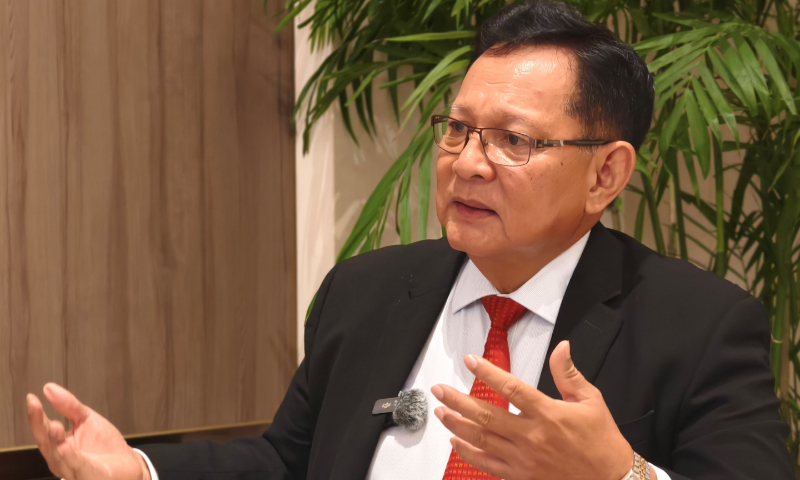
Raul Lambino, chairman of the Association for Philippines-China Understanding, speaks in an interview with the Global Times in Beijing on July 4. Photo: Zhao Juecheng/GT
"As a Filipino and as an Asian, I don't want my country to be a battleground." A video of Raul Lambino, chairman of the Association for Philippines-China Understanding, making these remarks while shedding tears has recently gone viral on social media. In an exclusive interview with the Global Times on Thursday, Lambino said that Philippines-China relations should not be defined solely by minor disagreements in maritime areas, and the South China Sea should serve as a maritime bridge linking the two countries.
While attending forums commemorating the 70th anniversary of the Five Principles of Peaceful Coexistence in Beijing on June 28, Lambino shared his concerns over the current situation in the South China Sea. He mentioned that many people in the Philippines are also asking, "is a war going to happen in the Philippines?"
"I cannot hold back my tears when I think of my motherland, my country, and my people. When I shed those tears, it wasn't for myself; it was for my country and my people. That's the emotion I couldn't suppress," Lambino told the Global Times.
He said that although he wasn't born until after the Second World War, he has read historical accounts and heard stories from his grandparents and mother, who experienced the horrors of the war.
"They kept telling me when I was a little boy: War is not good. Conflict is not good. You should always talk to others. When there's conflict, you should solve the dispute peacefully," said Lambino, noting that he does not want war to happen to his people or his beloved country.
"If, due to external interference, they dictate how we should conduct our affairs, it will affect our situation and relations with China, as well as with our other neighbors in Southeast Asia," he said.
Lambino noted that the Philippines and China have a long history as neighbors, friends, brothers and even family members. Whatever differences they may have right now can be resolved through respectful negotiations, consultations, and engagement, without escalating to more serious consequences.
While discussing the US' role in the current disputes in the South China Sea, Lambino said that it is clear that the US government has strong interests in the Asia-Pacific region, especially regarding the Taiwan question. However, in international law and relations, the Philippines adheres to the one-China principle, recognizing that there is only one China and Taiwan is part of China. This stance should be followed not only by the Philippines but also by other Asian countries and the US.
"One thing I cannot understand or accept is the Philippines being used by the Americans to protect their interests in Taiwan," said Lambino, noting that the use of nine military bases by the US is very alarming to him and to most Filipinos.
He asked why there are American troops in his country again. In the 1990s, people in the Philippines already said they did not want them there. Suddenly, after 20 years, the Americans are back. "What is the purpose of this? Is it really to defend the Philippines from another country?" said Lambino.
"I don't believe China, Japan, Russia, or Korea would invade the Philippines. These are powerful countries in the Asia-Pacific region, and I don't feel the Philippines is threatened by them," said Lambino, noting that not only Filipinos, but people in other ASEAN countries are also concerned about the US military presence.
Lambino also noted that the media in the Philippines has been influenced by the US and has painted a biased picture of China, suggesting China cannot be trusted. But the reality is quite the opposite.
"We're trying our best to explain to our people that we shouldn't define overall Philippines-China relations solely based on minor disagreements in our maritime areas. The conflicts or disputes between our countries are small compared to the broader relationship we share, including cultural heritage and other connections," said Lambino.
"There are more important issues like economic and trade relations between the Philippines and China. We cannot afford to jeopardize this relationship over minor disagreements or disputes in the South China Sea, which are exaggerated by malicious propaganda in the Philippine media," said Lambino.
"The South China Sea is a common area where we can develop resources beneficial to both the Philippines and China. While some may see the South China Sea as a point of contention, I see it as a bridge - a maritime link connecting our cultures, our nations, and our communities," said Lambino.
Following the viral video of him shedding tears, Lambino has faced criticism labeling him as "a puppet of China" or suggesting he is being paid by China. In response, Lambino said that hearing these voices is not painful when you are fighting for what is right.
"It is a small price to pay for the more important mission of preserving peaceful relations between the Philippines and China. As I said, there is no price for peace, but there is an enormous price for war, if that happens. That's why we must take action to preserve peace and this friendship," said Lambino.
Aside from negative criticism, Lambino said he has received numerous good wishes and thanks from Filipinos for speaking on their behalf.
"Diplomacy remains key to resolving our disputes. In the game of big powers, the ultimate sufferers will be the Filipino people. That's why we need to engage China bilaterally, face-to-face, and discuss everything openly," said Lambino, emphasizing that this is for the benefit of both the Chinese and Filipino peoples.
声明:本站所发布的文字与配图均来自互联网改编或整理,我们不做任何商业用途,版权归原作者所有,由于部分内容无法与权利人取得联系,如侵权或涉及违法,请联系我们删除,如需转载请保留原文地址:http://myrsf.cn/news/494a598969.html
